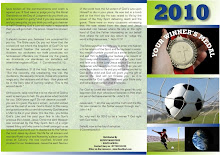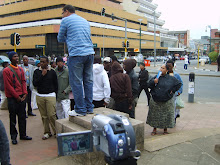 Continued from Part 1 by Dr. Peter Hammond ...
Continued from Part 1 by Dr. Peter Hammond ...A Reaction to Jihad
The crusaders were reacting to five centuries of relentless Islamic Jihad. The Middle East was the birthplace of the Christian Church. It was the Christians who had been conquered and oppressed by the Seljuk Turks. Many of the towns in the Middle East welcomed the crusaders as liberators.
Far from the crusaders being the aggressors, it was the Muslim armies which had spread Islam from Saudi Arabia across the whole of Christian North Africa into Spain and even France. Muslim armies sacked and slaughtered their way across some of the greatest Christian cities in the world, including Alexandria, Carthage, Antioch and Constantinople. These Muslim invaders destroyed over 3,200 Christian churches just in the first 100 years of Islam.
Against All Odds
When we think about the Middle Ages, we inevitably view Europe in the light of what it became rather than what it was. The fact is that the superpower of the Medieval world was Islam, not Christendom. The crusades were a battle against all odds with impossibly long lines of supply and cripplingly inadequate logistics. It was a David against Goliath enterprise from the beginning. The chances of success for the first crusade were highly improbable. They had no leader, no chain of command, no supply lines and no detailed strategy. The first crusade consisted simply of thousands of dedicated warriors marching deep into enemy territory, thousands of kilometres from home. Many of them died of starvation, disease and wounds. It was a rough campaign that always was on the brink of disaster. Yet by 1098, the Crusaders had liberated Nicea and Antioch, and in July 1099 they re-conquered Jerusalem.
Professor Madden, the author of A Concise History of the Crusades, has observed: “From the safe distance of many centuries, it is easy enough to scowl in disgust at the crusades. Religion, after all, is nothing to fight wars over. But we should be mindful that our Medieval ancestors would have been equally disgusted by our infinitely more destructive wars fought in the names of political ideologies…Whether we admire the Crusaders or not, it is a fact that the world we know today would not exist without their efforts. The ancient faith of Christianity, with its respect for women and antipathy toward slavery, not only survived but flourished. Without the crusades, it might have followed Zoroastrianism, another of Islam’s rivals, into extinction.” But for the crusades Europe would have probably fallen to Islam and the USA and South Africa would never have come into existence.
 Logistics and Economics
Logistics and Economics As the Christian History Institute has pointed out, the characterising of crusaders as only in it for the plunder and the loot betrays an ignorance of both geography and history. The vast majority of the crusaders were impoverished and financially ruined by the crusades. Crusaders, through great sacrifice and personal expense, left their homes and families to travel 3000km across treacherous and inhospitable terrain – and the shortest crusade lasted 4 years. Considering that only 10% of the crusaders had horses, and 90% were foot soldiers, the sheer fact of logistics is that the crusaders could not possibly have carried back enough loot to have made up for the loss of earnings and high expenses involved with these long crusades. Many crusaders lost their homes and farms to finance their involvement in the crusades.
There’s More to Life than Money
Perhaps self-seeking materialistic agnostics in the 21st Century cannot understand that some people could be motivated by something other than personal financial enrichment, but the fact is that many people make sacrifices for their religious convictions, and in order to help others. In the case of the crusaders, the historical record makes clear that amongst the motivations that led tens of thousands of volunteers to reclaim the Holy Land was a sense of Christian duty to help their fellow Christians in the East whose lands had been invaded and churches desecrated by Muslim armies, and a desire to secure access to the Holy Lands for pilgrims.
There was also a desire to fight for the honour of their Lord Jesus Christ, Whose churches had been destroyed and Whose Deity had been denied by the Mohammedan aggressors. In other words, to the crusaders this was a defensive war to reclaim Christian lands from Muslim invaders.
We may not share their convictions, or agree with their methods, but we ought to evaluate them in the light of the realities of the 11th and 12th centuries, and not anachronistically project our standards and politics back upon them.
 Jihad vs. The Gospel
Jihad vs. The Gospel The word “crusade” does not appear in the Bible, nor is it commanded in Christianity. However, Jihad is the sixth pillar of Islam and the second greatest command of Muhammad. It is not only commended, but commanded in the Quran.
The crusades ended many centuries ago, however Islamic Jihad is carried out to this day. Millions of Christians have been slaughtered throughout the centuries by Islamic militants – such as the 1.5 million Armenians murdered in Turkey in 1915. Christians have continued to be slaughtered by Islamic militants in Indonesia, the Philippines, Sudan and Nigeria to the present day.
Therefore, before Christians fall over themselves to apologise for the crusades, which ended over 700 years ago, it would be wise to first learn from reliable sources what the crusades were all about, and study the Islamic teachings and track record of Jihad over the last 14 centuries. Those who do not know their past have no future.
Dr. Peter Hammond has been a pioneer missionary to Muslims in Sudan. He is the author of Slavery, Terrorism and Islam – The Historical Roots and Contemporary Threat.


















